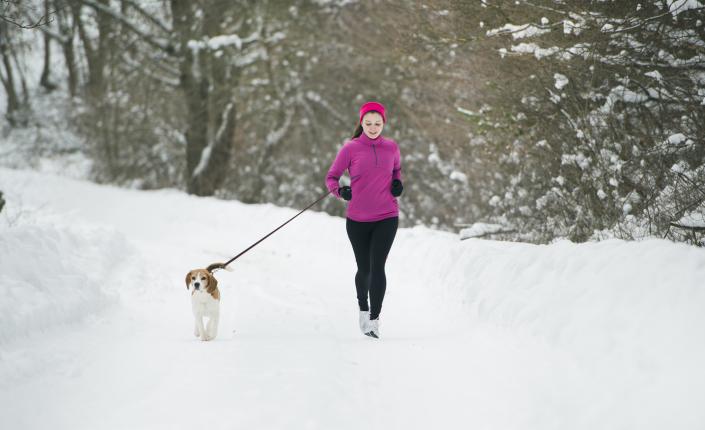Preventing Winter Weight Gain in Pets: A Veterinarian's Guide

Winter often means cozy evenings, holiday treats, and shorter days, but it can also result in less physical activity and weight gain for pets. Maintaining a healthy weight is essential for your pet's overall well-being, and with some proactive steps, you can keep them active and healthy even during the colder months. Here's a comprehensive guide to help you prepare for winter with your furry friends.
Get Ready with Winter Gear
Just as we bundle up, pets may also need extra protection against the cold. To encourage both you and your pet to enjoy the outdoors during winter, make sure you are both well equipped to be comfortable. Consider investing in waterproof coats or insulated jackets, especially for short-haired or smaller breeds. Paw protection, like booties or pet-safe balms, can shield against snow, ice, and harmful de-icing salts, which may irritate or injure their paws. Always wipe your pet's paws after walks to remove any residues.
Cold Weather Outdoor Fun
Dogs can enjoy outdoor exercise even in winter. Activities like brisk walks or playtime in the snow are excellent ways to stay active. Ensure your pet is comfortable with the temperature:
- Limit outdoor time for short-haired or smaller pets.
- Watch for signs of cold stress like shivering, whining, or reluctance to move.
- Avoid prolonged exposure when temperatures drop below freezing or wind chills are severe.
For pets that enjoy winter adventures, pack essentials like water (hydration is still key) and consider reflective or lighted gear for darker winter days.
Indoor Exercise and Mental Stimulation
When outdoor play isn't feasible, indoor activities can keep your pet engaged:
- Use interactive toys or treat puzzles to provide mental stimulation.
- Set up obstacle courses using household items.
- Play games like hide-and-seek with treats or toys. Cats can benefit from climbing trees, laser pointers, or feather wands to keep active.
Commit to a Routine
Pets thrive on consistency. Set a daily schedule for meals, exercise, and playtime to maintain their activity levels. Regular exercise also helps prevent behavioral issues stemming from boredom.
Monitor Food Intake
Winter often coincides with treats and leftovers, which can lead to unintentional overfeeding. Adjust your pet's caloric intake based on their activity level. Use treats sparingly or switch to low-calorie options. Remember, the occasional indulgence is fine, but it’s important to balance treats with proper nutrition.
Recognizing Cold Weather Risks
Protecting your pet’s health during winter includes understanding signs of serious cold-related conditions:
- Hypothermia: Symptoms include lethargy, weakness, shivering, and pale gums. Seek veterinary care immediately.
- Frostbite: Check extremities like ears, tails, and paws for discoloration or swelling. Avoid touching frostbitten areas and consult your vet promptly.
- Appropriate Exposure: Limit exposure based on breed and coat type. Northern breeds like Huskies tolerate cold better than short-haired breeds or small pets.
Additional Tips for Winter Wellness
- Skin and Coat Care: Dry winter air can irritate a pet’s skin. Regular brushing and occasional conditioning can help maintain coat health.
- Hydration: Pets need water just as much in winter as in summer. Keep water bowls unfrozen and accessible.
- Safe Spaces: Provide a warm, cozy indoor area for pets to rest, especially if they spend extended time outside.
Managing Indoor/Outdoor Cats in Winter
For cats that split their time between indoors and outdoors, winter introduces challenges that can impact their health and caloric needs. Cats who continue spending significant time outdoors may require additional calories to maintain their body temperature. Conversely, cats transitioning to more indoor time may need fewer calories to avoid weight gain.
Ensure outdoor cats have access to a safe, insulated shelter away from wind and moisture, as well as unfrozen water and appropriate food. Identification is essential: use a breakaway collar with updated tags and a microchip to help locate your cat if they get lost. Additionally, monitor their outdoor time to prevent frostbite or hypothermia, especially during extreme cold. Always check under car hoods before starting your engine, as cats may hide there for warmth.
With these strategies, you can help your pet avoid winter weight gain while staying happy and healthy. Whether exploring snowy landscapes or playing indoors, a proactive approach will ensure that both you and your furry companion enjoy the season together.